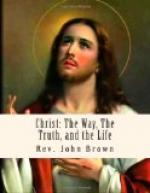3. This gospel holiness respects Christ as the altar. It is in him, and for him, that his soul is well pleased with our performance—this is the altar upon which thou must lay thy gift, and leave it, without which thy labour is lost, and whatsoever thou dost is loathed, as a corrupt thing. As believers draw all their strength from him, so they expect acceptance only through him, and for him. They do not look for it, but in the Beloved; they dare not draw near to God in duty, but by him. This is the new and living way which is consecrate for them; and if such, who offer to come to God, do not enter in hereat, instead of being admitted to a familiar converse with God, they shall find him a consuming fire. When the saints have greatest liberty in prayer, and so of all other performances, when their hearts are most lifted up in the ways of the Lord, they abhor at thinking their prayer can any otherways be set forth before him as incense, or the lifting up of their hands as the evening sacrifice, but as presented by the great intercessor, and perfumed by the merit of his oblation. If they could weep out the marrow of their bones, and the moisture of their body, in mourning over sin; yet they durst not think of having what comes from so impure a spring, and runs through so polluted a channel, presented to God, but by Jesus Christ, in order to acceptation; for, as they look to the exalted Saviour, to get their repentance from him, so when by the pourings out upon them of the spirit of grace and supplication, he hath made them pour out their hearts before him, and hath melted them into true tenderness, so that their mourning is a great mourning, they carry back these tears to be washen and bathed in his blood, as knowing without this of how little worth and value with God their salt water is; but when they are thus washed he puts them in his bottle, and then pours them out again to them in the wine of strong consolation. Thus are they made glad in his house of prayer, and their sighs and groans come up with acceptance upon his altar. O blessed altar, that sanctifies the gold! this is that altar, whereto the mocking moralist hath no right. It is by him that the poor believer offers up his sacrifice to God continually; whatever he doth in word or deed, he desires to do all in the name of the Lord Jesus. As he knows, he lives to make intercession, and to appear in the presence of God for his poor people, both to procure influences for duty, and plead for acceptation: so he depends upon him for both, as knowing he can never otherways hear nor have it said unto him, “well done thou good and faithful servant.” It may be he can do little, he hath but a mite to offer; but he puts it in the Mediator’s hand to be presented to God. He hath not gold, nor silver, nor purple to bring; he can do no great things; he hath but goats’ hair or rams’ skins, but he gives them the right tincture, he makes them red in the blood of Christ, and so they are a beautiful incarnation.




